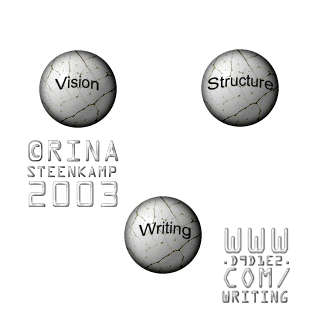
I'm writing a novel, and the first draft can be found elsewhere on the site. To sum up all lessons learnt while writing the latest episodes:
1) Don't try too hard;
2) Don't worry.
Or, if you really want to know:
Episode 40: end-of-part-1-please-don't-let-me-f*ck-this-up stress. Do-I-really-want-to-kill-him stress. I-know-how-this-will-end-so-I-can't-go-with-the-flow stress. I'm-cramming-too-much-into-one-episode stress.
Episode 41: I had lots of different ideas for things the protagonist would be seeing in his visions. Once I selected a few of those and started describing them in depth, the episode greatly improved. I spent a lot of time and energy trying to get started on a second draft in Dutch of episodes 1-40. I haven't yet figured out how to proceed, but I've decided not to worry about that for the moment.
Episode 42: more or less wrote itself. When I was writing this episode the protagonist's blindness came as a surprise, it was just one of those things that are suddenly there.
Episode 43: difficult going, possibly because I was trying too hard. Also, it had to be consistent with episodes 38-41 and I had somewhat painted myself into a corner in those.
Episodes 44-45: things are getting easier. With these episodes I've been trying to get back to a three episodes (1,500-2,500 words) a week schedule, and I think the writing is actually better for it.
Most of the advice to beginning novelists that I've read tells you to do a novel outline, chapter outlines, scene outlines, character descriptions, and work your way from there to the actual writing.
For me, this approach doesn't seem to work at all. I've tried various kinds of outlines, but either I haven't been able to think of anything to put in them at all, or once I started writing the story went its own merry way without bothering to adhere to anything I had planned. In a way this is odd, since when writing non-fiction (or software, when I still did that) the plan first, write later approach works fine for me, and I'm actually good at planning and conceptualising things.
I was relieved to find out that quite a lot of writers who I admire (Stephen King comes to mind) are non-outliners. On the other hand, there are also writers for whom outlining and planning seem to work fine. So, it seems to me that there's more than one kind of writer, and in order to develop my craft I'd first have to understand what kind of writer I am.
In order to try and understand the different kinds of writers, I'm proposing the following model of what writing is:

Vision: inspiration. Seeing what's going to happen next. I've seen this stage described as daydreaming, which fits my own experiences.
Structure: any kind of thinking about how you're going to tell the story.
Writing: the actual act of putting words together to form sentences. Of the three, this is the only one that is actually required.
My working theory is that, while for every writer usually all three will be present in some form, the difference between writers lies in which of the three elements is their primary entry-point. (Beware: thinking still in progress. More about this later.)
By the way, I think there are reasons that beginning writers are so often advised to outline:
1) outlining is easy to teach; and
2) outlining helps people produce results of a fairly predictable quality.
I must say that, in spite of my experiences so far, 2) rather appeals to me.
This article was written after writing episode 45 of the first draft of my novel After the War.
![]() After the War (45)
After the War (45)
On this page Transitional HTML 4.01 and CSS 1 are used. If you're seeing this text you either have CSS switched off in your browser, or you're using a browser that can't handle CSS. If you're using an older browser version, you might want to consider upgrading.